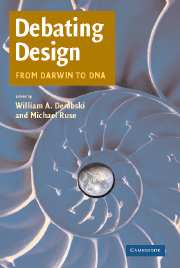Book contents
- Frontmatter
- Contents
- Notes on Contributors
- Debating Design
- INTRODUCTION
- 1 General Introduction
- 2 The Argument from Design
- 3 Who's Afraid of ID? A Survey of the Intelligent Design Movement
- PART I DARWINISM
- PART II COMPLEX SELF-ORGANIZATION
- PART III THEISTIC EVOLUTION
- PART IV INTELLIGENT DESIGN
- Index
- References
2 - The Argument from Design
A Brief History
Published online by Cambridge University Press: 05 June 2012
- Frontmatter
- Contents
- Notes on Contributors
- Debating Design
- INTRODUCTION
- 1 General Introduction
- 2 The Argument from Design
- 3 Who's Afraid of ID? A Survey of the Intelligent Design Movement
- PART I DARWINISM
- PART II COMPLEX SELF-ORGANIZATION
- PART III THEISTIC EVOLUTION
- PART IV INTELLIGENT DESIGN
- Index
- References
Summary
The argument from design for the existence of God – sometimes known as the teleological argument – claims that there are aspects of the world that cannot be explained except by reference to a Creator. It is not a Christian argument as such, but it has been appropriated by Christians. Indeed, it forms one of the major pillars of the natural-theological approach to belief – that is, the approach that stresses reason, as opposed to the revealed-theological approach that stresses faith and (in the case of Catholics) authority. This chapter is a very brief history of the argument from design, paying particular attention to the impact of Charles Darwin's theory of evolution through natural selection, as presented in his Origin of Species, published in 1859.
FROM THE GREEKS TO CHRISTIANITY
According to Xenophon (Memorabilia, I, 4.2–18), it was Socrates who first introduced the argument to Western thought, but it is Plato who gives the earliest full discussion, in his great dialogue about the death of Socrates (the Phaedo) and then in later dialogues (the Timaeus, especially). Drawing a distinction between causes that simply function and those that seem to reveal some sort of plan, Plato wrote about the growth of a human being:
I had formerly thought that it was clear to everyone that he grew through eating and drinking; that when, through food, new flesh and bones came into being to supplement the old, and thus in the same way each kind of thing was supplemented by new substances proper to it, only then did the mass which was small become large, and in the same way the small man big.
(Phaedo, 96 d, quoted in Cooper 1997, 83–4)Information
- Type
- Chapter
- Information
- Debating DesignFrom Darwin to DNA, pp. 13 - 31Publisher: Cambridge University PressPrint publication year: 2004
References
Accessibility standard: Unknown
Why this information is here
This section outlines the accessibility features of this content - including support for screen readers, full keyboard navigation and high-contrast display options. This may not be relevant for you.Accessibility Information
- 3
- Cited by
